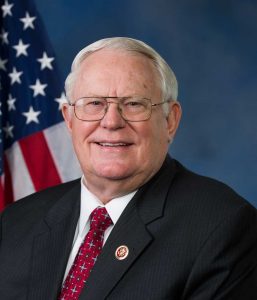By U.S. Rep. Joe Pitts, 16th Congressional District, Pa.

U.S. Rep. Joe Pitts (R-16)
As Co-Chairman of the Human Rights Commission in the House of Representatives, I am tasked with “promoting, defending and advocating” for international human rights standards in the U.S. Congress. But this month, I voted with a majority of my colleagues to curtail the application of a law designed to bring transparency to public companies sourcing conflict materials from Central Africa. The answer to why Congress did this lays within the beneficial effect of free markets upon human rights climates.
In the Democratic Republic of Congo (DRC), the father of a young boy named Bienfait Kabesha ran out of money to pay for his son’s schooling. Bienfait’s father worked in a tin mine, but he stopped making enough money to support his son’s education when foreign companies stopped buying minerals from his country.
The reason the companies stopped is because of a well-intentioned rule that U.S. lawmakers passed in 2010, requiring U.S. companies to disclose whether they have used minerals (like tin, tungsten, or gold) exported from Congolese mines controlled by violent militia, in their supply chains. Although the provision that the Securities & Exchange Commission (SEC) enforces seems like a good idea on its face, it has had a devastating effect on the Congolese economy.
When the SEC provision was originally enacted, the DRC shut down its mining industry for months in an attempt to certify the minerals that came from its mines were “conflict free.” The certification process has moved at a slow pace, though, which has caused multiple foreign companies to withdraw their investment from the Congo. Additionally, multiple reports and testimonies before Congress have cited doubts that the SEC requirements on companies are even effective in determining the true source of the minerals.
The SEC provision has arguably worsened the country’s human rights climate and driven the Congolese people even deeper into poverty and conflict.
In fact, the DRC isn’t the only country where barriers to economic development have damaged human rights climates. Significant evidence shows a strong connection between developing markets and a promotion of human rights standards.
Freedom House, which ranks countries annually as “Free,” “Partly Free,” and “Not Free,” has opined on this correlation during a past reporting period in 2013 – that all the “Free” countries shared one common feature: a market-based economy. The freer a market is, the better its human rights situation.
In a country that supports market development, the government provides the structure and rules of the road that allow for fair and binding contracts between parties and common rules that both parties must follow. A free market government also provides neutral forums where both parties can work out their differences; the government limits itself in a way that empowers individuals to do the best they can, and provides a framework to address any conflicts that occur.
When a reliable framework isn’t there to address grievances, it can perpetuate even more drastic inequity in a society and create tension and violence.
Additionally, if individuals see government as controlling their economic fate, and they feel insecure in their property (because the government isn’t properly enforcing property rights and punishing violations), their ability to hold on to any sort of basic human right is suspect. They feel unable to influence their own fate and impotent to defend their own property, which can put people in a place of desperation.
Desperation is an understatement in the context of the harmful effects that exploitation, civil strife and violence is placing upon the people of the DRC and most of the Central Africa Region. In its 2016 report, Freedom House assessed the entirety of the region to be “Not Free.” However, solutions for respecting international human rights standards ultimately must rely on governments and companies themselves and not the short reach of the SEC.
Governments must respect rule of law, private property rights, and the prosperity of its people. Companies seeking to extract resources must act as a party in promoting these rights. By shutting out Central African countries from market access, we are taking away a strong incentive for governments to make rule of law changes. As Congress continues to address the problem of human rights abuses related to resource extraction in the developing world, we must move forward in a way that strengthens market access and the rule of law. Shielding Central Africa from economic development may inevitably deny its people the pursuit of happiness that acts as a powerful force for human rights promotion.




